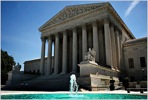July 2011
Now that the U.S. Supreme Court has ruled that corporations are even more like people than the law previously adjudicated, less-than-ethical business leaders can take even more advantage of the market, tilting the scales of fairness even further in their favor. Thus the gap between the richest one-percent and the rest of us continues to widen (see my May’s blog).
Thanks to corporate lobbying that began long ago, initiated by the railroads in the mid-19th Century, the rules have changed dramatically over time, little by little. Like the slow-boiled frog, public awareness of this insidious creep toward more and more unfettered power for corporations has been minimal. Another effect of corporations getting more and more power and control is that their responsibility to the general public – once a condition for obtaining a corporate charter – has been significantly reduced if not eliminated altogether.
Originally, corporations were chartered by regional governments as public benefit entitles. They were often discontinued after a certain project was completed, such as a bridge-building corporation which was dissolved after the bridge was completed. Corporate charters actually expired. To renew them, a case for the public benefit needed to be made again.
As corporations gain more power through lobbying, purchasing political power, influencing foreign policy, including what wars we start, and amassing huge amounts of tax-free reserves in offshore accounts, it begins to get obvious that corporations – particularly the publicly-held types – are the 800 pound gorillas who get whatever they want. This is what is known as “corporatocracy” – defined by Wikipedia as “a system of government that serves the interest of, and may be run by, corporations and involves ties between government and business.”
Their appetite seems ravenous, always seeking more power, greater advantages in the marketplace, all the while screaming for free markets and government deregulation. For example, U.S. banks invaded Washington with a tripling of lobbyist population in the late 1990s resulting in the overturn of the Glass-Steagall Act which had keep conservative commercial banks and speculative investment banks separate since the Great Depression, legislation that seemed to be doing a good job for sixty or so years. After the repeal it took only nine years for the banks to cause the biggest financial crisis at least since the Great Depression and possibly of all time.
Now that corporations are closer to being people (at least in the eyes of our legal system) perhaps they will develop a conscience. This is where real leadership is called for – what I call “conscious leadership.” This requires a strong sense of fair play, despite the pressures and ideologs backlash. This takes courage – spiritual courage – that takes stands for what’s right and fair and sustainable. Conscious leaders not only take stands, they are stands for what they know to be the right thing. They aren’t tripped up by the big lie – that the free market is really free. That’s what the market fundamentalists say over and over again so people start to believe it. What they don’t say is that they have manipulated and tweaked the system so it works to their advantage and they don’t want anyone messing with it unless it is to make it even more advantageous for them.
If corporations are ever to find a conscience it is going to come in the form of a few conscious leaders who stand for this kind of truth-telling and are willing to buck the system that continues to get more powerful with decisions like the one the Court made in 2010. From all the indicators our political leaders don’t have the courage – the chutzpah – to do what’s right, what’s best for the whole country. They defer to doing what they think will get them elected. This is where the “power of the people” must come into play. Our political leaders do not have the will so it must come from we who elected them.
Two generations of corporate lobbying to change the law and tilt the table of fairness must be undone if the people ever want to take back their power. We need to provoke and participate in a revolution of conscience. Like other revolutions, this will require courageous action, strong stands, putting country over ideologies, including careers in government, and working together to pull this off. It may even take a complete reinvention of government.
It can be done, so it isn’t a matter of possibility. It is a matter of whether or not we have the collective will.
